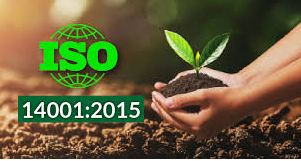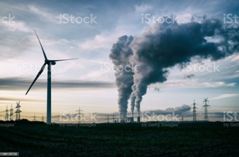Environment Management System (EMS) (ISO 14001:2015)

What is Environment?
Environment means which are around us – those are living or non-living objects, It consists of Air, Water, Land , Trees & Plants, Animals including Human beings. So, Air means our gaseous atmosphere, water is liquid hydrosphere, Land is the solid lithosphere and Animals & Humans are in biosphere.

Air (gaseous atmosphere): which consists of different gases – major components are Nitrogen about 78.1%, Oxygen is 21%. Small amounts of other gases like CO2, O3, Argon, etc. also exist.
Water (liquid hydrosphere): About 70% area of our Planet is under water and only 30% is the land. As we know, about 97% of total is saline water which we find in different seas and oceans and 3% fresh water only is available in the Lakes, rivers, ponds, glaciers and ground water. Flora and fauna are available in the water.
Land (solid lithosphere): The land is being used for cultivation or agriculture, forestry, habitation and commerce or industrial usages. Land is a source of various minerals like iron, aluminum, copper, zinc, etc. and also for fossil fuels like coal, petroleum and natural gases, etc.
Animals & Humans (Biosphere): It is the place, where ecological system exists, which integrates all living beings and their relationships including their relation or interaction with the air, land and water.
What are the Environmental Pollution?
Pollution means contamination, it contaminates our environment which includes mainly Air contamination or pollution, Land contamination or pollution and Water contamination or pollution. So, pollutant is the causes of contamination and it has a detrimental or bad or harmful effect on flora and fauna. Pollutant may be in solid or liquid or gaseous in nature around us. So, major pollution are 1) Air Pollution, 2) Land Pollution and 3) Water Pollution.

Air Pollution :Air pollution is increasing due to the industrialization, growing urbanization, huge traffics or vehicular movements, burning of fossil fuels, forest fires, etc. So, it consists of pollutants like particulate matters( PM 10,PM2.5), Sulphur-dioxide( SO2),Nitrogen-dioxide( NO2),Carbon monoxide(CO), carbon dioxide(CO2),Chlorofluorocarbons(CFC).

Land Pollution: It is the deterioration or degradation or destruction of the quality of existing land or soil due to industrial or municipal wastes dumping, agricultural wastes including the usages of pesticides, insecticides, mining activities and hazardous wastes including plastics, bio-medical wastes disposal into the land.
Major causes for land pollution are 1) Industrial wastes, 2) Municipal or domestic wastes, 3) Hospital or Bio-medical wastes,4) Spillage of petroleum products,5) Massive usages of pesticides, insecticides, herbicides in agricultural works,6) Spillage of hazardous chemicals etc.
Water Pollution: We can simply define the water pollution as contamination of water due to our own causes or misdeeds. Water is becoming contaminated, when impurities or toxic substances or pollutants are mixing or seeping or leaching into the water bodies like ponds, lakes, rivers, seas, oceans and ground waters.

Different types of Pollutants sources are there, such as –
1) Industrial Effluents – Toxic and waste water from factories or production units are leaching into the water bodies directly. Many big industries have the effluent treatment facilities before the discharge, but most of the small or medium scale industries are not having the ETP (effluent treatment plant) to process these toxic effluents before release and of course to meet the requirements of Pollution Control Board (PCB) as laid down in this regard.
2) Agricultural runoff & wastes – For cultivation , fertilizer, pesticides, insecticides are being used frequently , these pesticides, insecticides, herbicides, fertilizers’ residues, manure of livestock from agricultural field are leaching into a stream by rain water, in the form of run-off which in turn affects the flora and fauna.
3) Mining – Due to mining large amount of acidic water, ore washing , heavy metals dumping are affecting or contaminating the ground & surface waters on those areas. Moreover, chemicals release due to mining operations is also contaminating the ground water and the nearby water bodies.
Large quantity of water is generally used during ore processing and dust suppression in & around of mining areas.
4) Domestic and Sanitary Sewage – These waste waters are the mixture of wide variety of suspended impurities, harmful bacteria, disease causing microbes, toxic chemicals, which are mixing with the rivers , ponds ,lakes, seas and upsetting or disturbing the ecological balance of these water bodies.
What is ISO 14001:2015 ?
ISO 14001:2015 is dealing with the Environmental Management System. The purposes of the Environmental Management System of an Organization — Increase the overall Environmental performance including the adherence to relevant compliance obligations or legal requirements, achievement of Environmental objectives. The Organization manages its Environmental responsibilities or activities in a systematic manner and maintains a sustainable growth in this regard.
The Requirements of ISO 14001:2015 Standard to establish the Environmental Management in an Organization are as below:
Non-auditable clauses:
Clause no.1 — Scope
Clause no.2 — Normative References
Clause no.3 — Terms and Definitions
Auditable Clauses:
Clause no.4 – Context of the Organization
4.1 – Understanding the organization and its context
4.2 – Understanding the needs and expectations of interested parties
4.3 – Determining the scope of the environmental management system
4.4 – Environmental management system
Clause no.5 – Leadership
5.1 – Leadership and commitment
5.2 – Environmental Policy
5.3 – Organizational roles, responsibilities and authorities
Clause no.6 – Planning
6.1 – Actions to address risks and opportunities
6.1.1 – General
6.1.2 – Environmental aspects
6.1.3 – Compliance obligations
6.1.4 – Planning action
6.2 – Environmental objectives and planning to achieve them
6.2.1 – Environmental objectives
6.2.2 – Planning actions to achieve environmental objectives
Clause no.7 – Support
7.1 – Resources
7.2 – Competence
7.3 – Awareness
7.4 – Communication
7.4.1 – General
7.4.2 – Internal communication
7.4.3 – External communication
7.5 – Documented Information
7.5.1 – General
7.5.2 – Creating and updating
7.5.3 – Control of documented information
Clause no.8 – Operation
8.1 – Operational planning and control
8.2 – Emergency preparedness and response
Clause no.9 – Performance evaluation
9.1 – Monitoring, measurement, analysis and evaluation
9.1.1 – General
9.1.2 – Evaluation of compliance
9.2 – Internal Audit
9.2.1 – General
9.2.2 – Internal audit programme
9.3 – Management Review
Clause no.10 – Improvement
10.1 – General
10.2 – Nonconformity and corrective action
10.3 – Continual improvement

Benefits of Environment Management System (ISO 14001:2015)
1) Improved Environmental pollution control.
2) Good adherence to Compliance obligations/Legal requirements.
3) Establish the waste disposal system appropriately.
4) Better Environmental performance.
5) Conservation of natural resources.
6) Establish the good relationship with neighbors, regulatory bodies and other interested parties.
7) Reduce the risk of caught unaware.
8) Increase cost effectiveness and reduce the cost.
9) Opportunity to access in global markets.
10) Continual improvement in all respect to enhance the environmental performances.
I wanted to thank you for this wonderful read!! I definitely enjoyed every bit of it. I have got you book-marked to check out new things you postÖ
Greetings! Very helpful advice on this article! It is the little changes that make the biggest changes. Thanks a lot for sharing!
I was very pleased to find this site. I wanted to thank you for your time for this particularly wonderful read!! I definitely savored every little bit of it and i also have you book-marked to see new stuff in your site.
Good luck! Good initiative to protect the Environment through appropriate management system.
Through this writing – more awareness is creating and spreading to save our planet.
Burning topic to protect the Environment. This knowledge is necessary for every individual.
Good Illustration and very concise to make understand the Beginners.
Good illustration and latest knowledge to upgrade ourself.
Simply wish to say your article is as astonishing. The clearness in your post is just cool and i can assume you are an expert on this subject.
Fine with your permission allow me to grab your
feed to keep updated with forthcoming post. Thanks a million and please
keep up the enjoyable work.